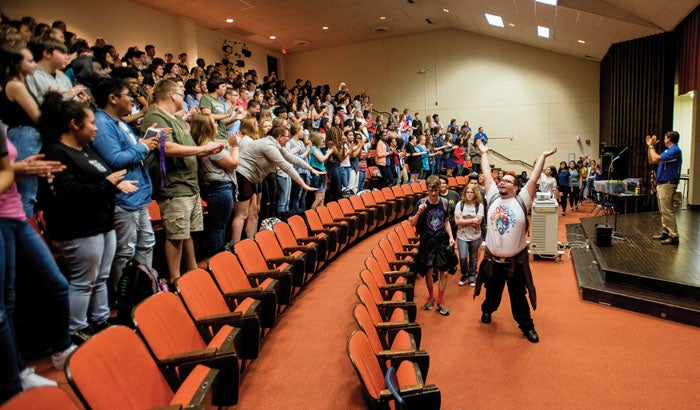Dart and laurel: Early College being slighted
Published 12:00 am Tuesday, November 20, 2018

- Underclassmen stand and clap as the senior class arrives as Rowan County Early College held a opening assembly in August at Rowan-Cabarrus Community College. Jon C. Lakey/Salisbury Post
Laurels to Rowan County Early College students for sounding off to Rowan County commissioners on Monday about the state of their facility — or rather, the lack of a permanent facility for them. The program started in 2009 with 50 students and has operated out of mobile classrooms on at Rowan-Cabarrus Community College ever since a campus construction project forced them out of a building. Now enrollment is more than 200 and could be higher if the program had more space.
The idea of Early College is to let students take college courses as well as high school courses and end their high school career with a high school diploma and college credits — usually, an associate degree — and a head start on earning a bachelor’s degree.
Rowan County Early College students score extremely well on achievement tests; virtually all of them graduate and go on to college. They have created an A+ school on the state’s rigorous grading schedule. Yet their program gets second-class treatment.
Mobile classrooms might be fine for an experimental program, but Early College has proven its worth. The county, RCCC and Rowan-Salisbury Schools should collaborate to provide Rowan County Early College better facilities and give the program room to grow.
Dart to robocalls, those annoying recorded calls that had your phone ringing more than usual before the Nov. 6 election and continue in some form all year long.
Roughly 30.5 billion robocalls flooded U.S. consumers’ and businesses’ phones in 2017, according to YouMail. That broke the record of 29.3 billion calls in 2016.
Commercial robocalls are already illegal, but identifying, finding and prosecuting the responsible parties within the one-year time limit often stumps the Federal Trade Commission. It wouldn’t be worth the trouble if not for the vulnerable people who get sucked into phone scams and defrauded of hard-earned money.
Ditto with political robocalls. The laws for these are different from commercial call because of free speech rights, but state law requires the people making the calls to give their name, contact information and reason for the call. It’s easy enough to ignore them, but there has to be some accountability for for slanderous content and innuendo.
The FCC is working on a plan that will use a verification system to stop robocall companies from spoofing — that is, masking the numbers that’s making the call. This would be one step in the right direction. We’d like to see more.

